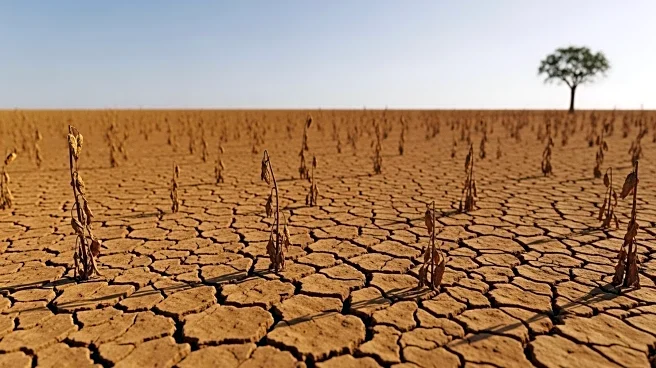What is the story about?
What's Happening?
A recent study has highlighted the decline in land productivity in the Great Green Wall (GGW) region of the Sahel, a semi-arid transition zone between the tropical rainforest in southern Africa and the arid northern desert. The study, conducted by analyzing various factors such as temperature, radiation, precipitation, and rising CO2 levels, found that human contributions to restoration efforts are significantly outweighing degradation. The GGW initiative, involving 11 countries including Ethiopia, Chad, Niger, and Mali, aims to address land degradation and climate change impacts. The study utilized high-resolution datasets to assess vegetation greenness dynamics from 2015 to 2022, revealing that while some recovery has occurred with increased rainfall, severe drought periods have led to extensive vegetation degradation.
Why It's Important?
The findings underscore the critical challenges faced by the Sahel region in combating land degradation and achieving sustainable development goals. The decline in land productivity poses significant threats to food security and economic stability in the region, which is already vulnerable to climate change impacts. The study's emphasis on human contributions to restoration highlights the importance of continued investment in sustainable land management practices. This research provides valuable insights for policymakers and stakeholders involved in the GGW initiative, emphasizing the need for coordinated efforts to enhance land productivity and resilience against climate variability.
What's Next?
The study suggests that further research and development are needed to refine land productivity assessment methodologies and improve restoration strategies. Policymakers and stakeholders are encouraged to leverage the study's findings to enhance the effectiveness of the GGW initiative. Continued collaboration among the involved countries and international organizations will be crucial in addressing the complex drivers of land degradation and implementing sustainable solutions. The study also calls for increased funding and support for local communities to strengthen their capacity to manage land resources effectively.
Beyond the Headlines
The study highlights the ethical and cultural dimensions of land restoration efforts in the Sahel region. It emphasizes the role of indigenous knowledge and practices in enhancing land productivity and resilience. The research also points to the potential for long-term shifts in land use patterns and agricultural practices, driven by climate change and restoration initiatives. These shifts could have profound implications for the region's socio-economic development and environmental sustainability.
















